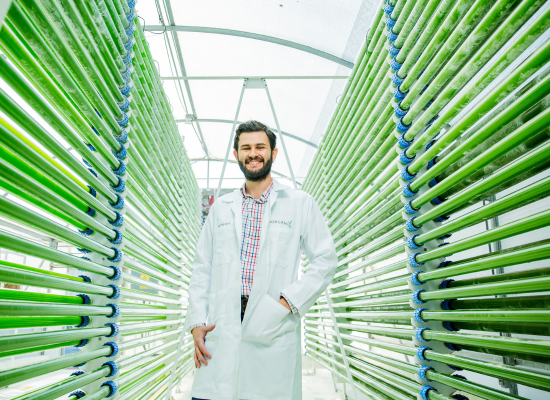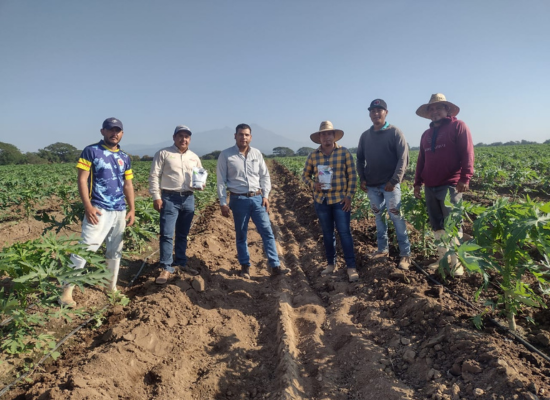Besides fixing CO2, the extraction process is green and following sustainability principles, as it does not include any heavy chemicals or solvents, thus protecting farmers and consumers and the environment. For these reasons, Neptunus Biotech has been chosen as one of the ISC3 Innovation Challenge 2023 finalists, and is featured as the ISC3 Start-up of the Month for April 2024.
To tackle the increasingly poor performance of crops due to environmental stress the start-up developed a set of bio-stimulants based on extract of microalgae from strains of different species. The specific formulations are applied to specific stages of development of the crop. The different solutions either focus on initial stages of plant development, plant growth, flowering or deficiencies in nutrition, that are also related to stress. This stress can be environmental, such as drought, extreme temperature or mechanical and chemical damage by machinery, synthetic pesticides and fertilizers.
The most significant aspect of sustainability can be explained as follows: Other existing products on the market, based on synthetic phyto-hormones or growth regulators, tend to have high negative impact on the soil, product, farmer and consumer – basically the whole production cycle – because of their chemical toxicity. Neptunus´ products also do not require a harsh extraction process with strong acids or bases for cell breakdown, like most other products. The use of microalgae not only increases the plants resilience towards environmental stress, but also reduces the carbon footprint of agrochemicals by the microalgae´s natural ability to fix CO2 via photosynthesis. The problem of toxicity of agricultural fertilisers does not exist with this product, based on naturally occurring organisms. Currently, the start-up offers six products, focusing on agricultural use.
The whole success story of the ISC3 Start-up of the Month in April 2024 is currently told on our website.
Three questions for Leopoldo Herrera (founder & director of Neptunus Biotech):
What led to your solution in Sustainable Chemistry?
Leopoldo Herrera:
I come from a 3-generation family of farmers and, as I grew up, I've come to know what they've always been exposed to, in terms of dangerous chemicals. Also, I know their biggest concerns and motivations driving them. I think that's what's always driven me to work on the field of agriculture or to develop technological solutions for agriculture: that bond with my family and people working field. Microalgae weren't being used for agriculture at all - there were some academic publications, but there were no products in the market. So that's why we decided to explore at the moment if there was any potential. We were lucky to see that there were some very interesting effects of applying the microalgae to different crops in specific assays. And then it just started growing from there. We had to select from an initial pool of approximately 100 different species that we had access to and we were able to narrow it to three, which are the ones we use now.
What does being chosen as ISC3 Start-up of the Month mean to you?
L. Herrera:
That means a lot. It made me very excited when I got the email. I think it is very important for companies like Neptunus Biotech to get this type of recognition because it's is an excellent way of showing what we're doing to the world, to different geographies and also to clients and potential inventors. It gives us more credibility in a more expanded way, I would say. It´s precisely what a start-up with limited resources for marketing needs and these kinds of things help a lot.
What’s next up at Neptunus Biotech?
L. Herrera:
We are working very hard on getting registrations of our products and getting our products tested in other markets beyond Mexico - so we're looking for expanding into the U. S. in the next two years, where we've already started with product registrations. We are also very interested in helping other Latin American markets such as Peru and Chile. Last year we went into Nicaragua and we were already in Ecuador. This year we may also go into Honduras in Central America. It's very important for us because these are all countries that are developing economies but are very important in terms of food production. These are partners that have the conditions that we can help with our solutions.



